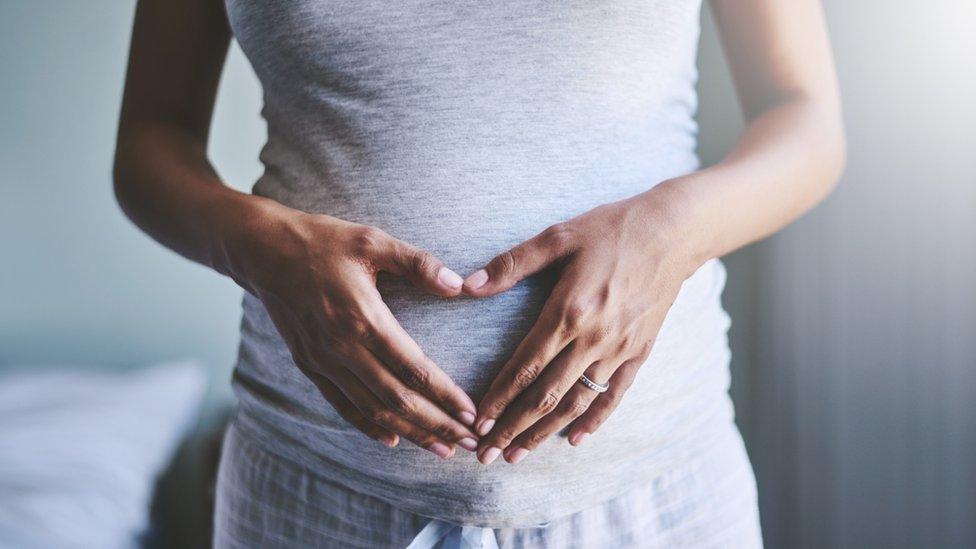Pregnant women should be offered Covid vaccine
- Published

Pregnant women should be offered a Covid jab when other people their age get one, the UK's vaccine advisers say.
They say the Pfizer and Moderna vaccines are preferable because data from the US in 90,000 pregnant women has not raised any safety concerns.
Up until now, only women with underlying health conditions or those whose risk of exposure to the virus was high were eligible.
The shift in advice brings the UK into line with other countries.
The Joint Committee on Vaccination and Immunisation now advises that pregnant women should all be offered the Pfizer-BioNTech or Moderna vaccines where available, at the same time as the rest of the population.
They are encouraged to discuss the risks and benefits of the vaccines with their doctor before making the appointment, but it is not a requirement.
"There is no evidence to suggest that other vaccines are unsafe for pregnant women, but more research is needed," it added.
Why it's recommended you get the Covid vaccine if you're pregnant
Currently, there is a lack of data on the AstraZeneca vaccine in pregnancy because pregnant women were not included in trials, but the JCVI says more evidence may be forthcoming in the near future.
The JCVI has already said that, as a precaution, adults under 30 should be offered an alternative to the AstraZeneca jab because of evidence possibly linking it to extremely rare blood clots in adults.
Professor Wei Shen Lim, Covid-19 chair for the JCVI, said: "We encourage pregnant women to discuss the risks and benefits with their clinician - those at increased risk of severe outcomes from Covid-19 are encouraged to promptly take up the offer of vaccination when offered."
Dr Edward Morris, president of the Royal College of Obstetricians and Gynaecologists, said: "Vaccination offers pregnant women the best protection from Covid-19, which can be serious in some women.
"We believe it should be a woman's choice whether to have the vaccine or not after considering the benefits and risks, and would encourage pregnant women to discuss with a trusted source like their GP, obstetrician or midwife, or a healthcare professional in a vaccination centre."
Dr Mary Ross-Davie, from the Royal College of Midwives, said the new advice was "a sensible step" by the vaccines committee.
She said midwives and obstetricians "will be there to support pregnant women to make an informed decision that is right for them".
Complications risk
Women can be vaccinated at any time during their pregnancy although they may prefer to wait until after the first trimester or the first scan, the RCOG said.
Although pregnant women are at no greater risk of being infected by the virus, they are more likely to have complications from Covid-19.
Data shows that one in five pregnant women who become unwell with Covid needs to have her baby delivered early.
As the UK's vaccination programme is now inviting people in their 40s, clarity on advice for pregnant women on the vaccine was needed.
More than 32 million people in the UK have received a first dose of a Covid vaccine.
Women who are planning pregnancy or are breastfeeding can be vaccinated with any vaccine, depending on their age and clinical risk group, the JCVI said.
It said it would closely monitor the evidence on Covid-19 vaccination in pregnancy and update its advice as required.

Are you pregnant? How do you feel about this news? Email: haveyoursay@bbc.co.uk, external.
Please include a contact number if you are willing to speak to a BBC journalist. You can also get in touch in the following ways:
WhatsApp: +44 7756 165803
Tweet: @BBC_HaveYourSay, external
Please read our terms & conditions and privacy policy
If you are reading this page and can't see the form you will need to visit the mobile version of the BBC website to submit your question or comment or you can email us at HaveYourSay@bbc.co.uk, external. Please include your name, age and location with any submission.
Related topics
- Published2 April
